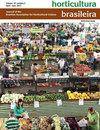高密度种植系统中的巴巴多斯醋栗芽生产
IF 0.8
4区 农林科学
Q4 HORTICULTURE
引用次数: 0
摘要
巴巴多斯醋栗(BGB)是一种非传统的蔬菜,因其丰富的营养价值,尤其是蛋白质含量而备受关注。然而,目前尚缺乏完善该植物种植体系的科学资料。本研究拟对BGB高密度栽培体系进行评价。该试验在巴西帕拉纳本文章由计算机程序翻译,如有差异,请以英文原文为准。
Barbados gooseberry sprout production in a high-density plantation system
ABSTRACT Barbados gooseberry (BGB) is a non-conventional vegetable highlighted for its nutritional value, particularly its protein content. However, there is a lack of scientific information for improving the plantation system of this plant. This research proposed to evaluate high-density systems to cultivate BGB plants for sprout production. The experiment was carried out in the Horticulture Sector of the Canguiri Experimental Station Farm from UFPR, located in the county of Pinhais, Paraná State, Brazil. BGB was planted in open field beds using distinctive plantation systems according to plant stands and pruning and thinning management. The experimental design was randomized blocks with three repetitions per treatment. Five high-density plantation systems (treatments) were tested: 10 (10?10): 10 × 10 cm; 2) (20?20): 20 × 20 cm; and 3) (30?30): 30 × 30 cm spacing with thinning to keep one sprout growing per primary branch per plant; 4) (30?30TS) was represented by 30 × 30 cm spacing with thinning to keep one sprout growing from each of two secondary branches grown from the primary branch to give two sprouts (TS) per plant; 5) (30?30FS) consisted of plants with 30 × 30 cm spacing with no thinning (FS = free growing sprouts). The first three treatments were thinned to one sprout per plant. Protein content of BGB sprouts was also determined to verify its real protein content. A high-density plantation system promoted BGB sprouts productivity with high protein content (28.8% from leaves of sprout). Treatment 5 produced the highest yield (21.7 t/ha per month).
求助全文
通过发布文献求助,成功后即可免费获取论文全文。
去求助
来源期刊

Horticultura Brasileira
农林科学-园艺
CiteScore
1.40
自引率
28.60%
发文量
45
审稿时长
4-8 weeks
期刊介绍:
The journal Horticultura Brasileira, a quarterly journal, is the Official Publication of the Sociedade de Olericultura do Brasil.
Its abbreviated title is Hortic. bras., and it should be used in bibliographies, footnotes, references and bibliographic strips.
 求助内容:
求助内容: 应助结果提醒方式:
应助结果提醒方式:


